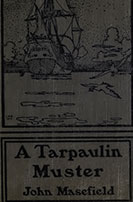A Tarpaulin Muster
Publisher’s advertisement
John Masefield’s collection of short stories, A Tarpaulin Muster, appeared in Grant Richards’s advertisement facing the title page of Dubliners. Richards went on to publish a number of Masefield’s books of poetry and prose. A Tarpaulin Muster is a collection of short stories and articles about seafaring life that originally appeared in The Manchester Guardian, Macmillan’s Magazine, Country Life, and the Speaker.
In “The Bottom of the Well,” one of the stories collected in A Tarpaulin Muster, Masefield describes a very curious type of library and an uncommon cast of readers. Like many of Masefield's stories, a sailor recounts a tale to one of his comrades. Bill, the story's protagonist, acquired a literary affliction in his youth: overexposure to novels caused an inability to tell the truth. Bill's tall tales earn him an invitation to a magical island ruled by a distraught book collector and truth seeker. Upon entering the palace, the salty raconteur confronts a strange library:
So when they come to the palace there was nothing but books written by them novel fellers. The palace was stowed with them, like a ship with dunnage. Heaps and heaps of them, new and old, big and little, Bible books and Deadwood Dickeys. You never saw such a gash of books. And all along the books there was a sort of row of cells, like in Liverpool Jail, with voices coming out of them like Liverpool Jail on Sunday. ‘What's in them cells?’ says Bill. ‘Just writer fellers,’ says the little man. (181)
The owner of the library imprisons books and their authors for deviating from strict reality. Masefield also experienced some anxiety about the writer's relationship to relating truth through fiction. This strange meditation on the relationship between art and life has dire consequences for those who would see fantasy substituted for reality. Masefield shared this anxiety. In responding to a question about the veracity of the stories and experiences he writes about in A Tarpaulin Muster, Masefield writes, “[y]ou must tell your friends that I am, quite frankly, a fraud, + that I have very little sea-experience; but you must tell them also, that an artist is only hampered by experience; + that it is no more necessary to be a sailor, to write about the sea than it was necessary for Shakespeare to keep a brothel, or to poison his father, in order to write parts of Hamlet + of Measure for Measure. . . . The Well [is] invention, + very bad at that” (qtd. in Errington 34).
The relationship between reality and literary representation was a point of contention between Joyce and Grant Richards over Dubliners. Richards, who was attempting to avoid a libel suit and losses sustained over possible censorship, wanted Joyce to remove a number of references to Dublin establishments and persons both alive and dead.

